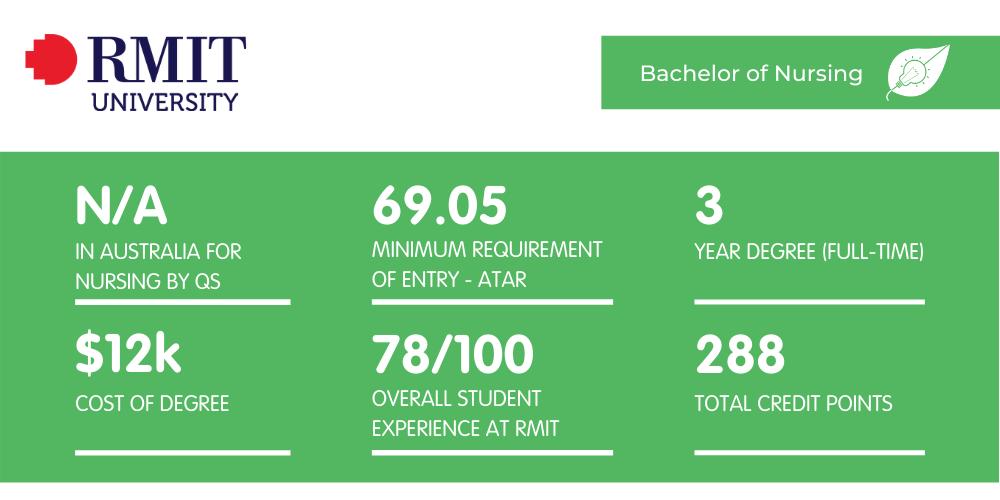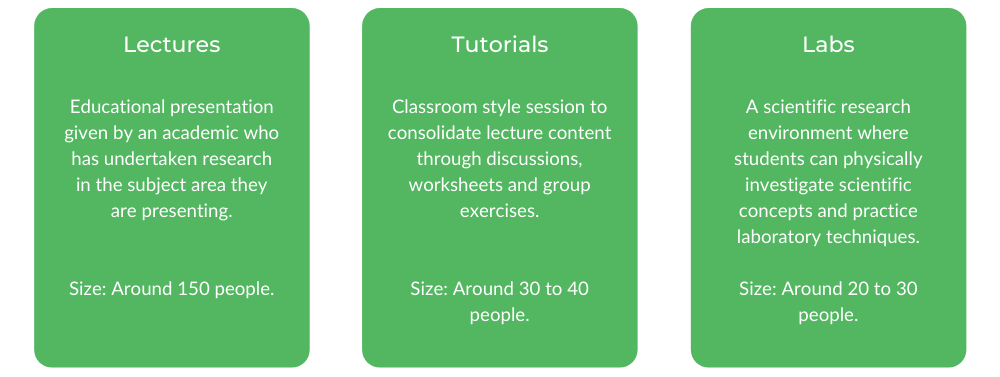Do you enjoy taking care of others and thrive in social settings? Wanting to study something in university, but unsure what? Then, studying a Bachelor of Nursing at RMIT is something you should consider!
In this article, we’ll give all a great overview of what it’s like studying this degree — from the core units, application process to uni societies you should look into.
So, let’s dive in!
What is a Bachelor of Nursing at RMIT?
Core Units for this Degree
How to Get into a Bachelor of Nursing at RMIT
What’s the Teaching Format?
What’s the Faculty and Culture Like?
What is a Bachelor of Nursing at RMIT?
A Bachelor of Nursing at RMIT teaches students all the skills and experience to be accredited by the Australian Nursing and Midwifery Accreditation Council (ANMAC) — in other words, graduates will be allowed to professionally practice as nurses in Australia.
To do this, RMIT’s three-year course combines studying theory on bioscience, performing in-class clinical simulation, and working in nursing placements. These are taught either online, in on-campus hospitals, as well as partnered hospitals in Victoria such as The Alfred and Royal Melbourne.
Career Pathways
Graduates of a Bachelor of Nursing typically proceed to work as registered nurses, either in public or private practices. Nurses are needed in a large range of fields including:
-
- Mental Health
- Emergency
- Rehabilitative
- Neonatal
- Paediatric
Core Units for this Degree
At RMIT, all units in a Bachelor of Nursing are core units — with the exception of one elective.
First Year
The first year of study introduces students to the fundamentals of nursing and health care practice in Australia. For example, there are two Principles and Practice of Nursing units that focus on understanding the safe and ethical handling of patients and the variety of clinical situations to consider appropriate nursing care.
There is also a theoretical component, in units such as Introduction to Human Biosciences and Systems Physiology, that teach the scientific background behind human body systems.
Second Year
The second year focuses on nursing in acute care, such as medical, mental health and surgical settings. For example, the units, Medical and Surgical Nursing 1 & 2, address the risk reduction of high-risk patients and methods in early disease detection.
These combine understanding the theoretical processes of specific acute and chronic diseases and appropriate nursing protocol for these situations.
Third Year
The third year revises the student’s knowledge of nursing before they work as a registered nurse, mostly by setting the larger context of working as a nurse. For example, Law and Ethics for Health Professionals explores the ethical decision-making nurses confront and refines student’s professionally acceptable behaviours.
Are there any majors?
There are no majors in a Bachelor of Nursing at RMIT. But, there is the option for one of the following electives:
These deepen the student’s knowledge in their possible fields of interest. For example, Dual Diagnosis Co-morbidity and Society explores the therapeutic strategies for situations of drug addiction, homelessness and poverty.
Are there any work placements?
There are five work placements to complete in a Bachelor of Nursing. These are prearranged in a mental health or acute care clinical setting and undertaken during the semester.
As these placements each require 160 hours of experience, it is important for students to keep an organised time schedule and learn to balance study with other important parts of their life.
How to Get into Bachelor of Nursing at RMIT
The ATAR cut-off for a Bachelor of Nursing at RMIT is 69.05.
For those who do not meet the cut-off, the most suitable option is to complete a two-year Diploma in Nursing and then automatically advancing into a Bachelor of Nursing at RMIT. In this pathway, a Bachelor of Nursing at RMIT is 2.5 years (instead of 3 years) long!
Prerequisites
The prerequisite knowledge is a satisfactory completion of any Mathematics and a study score of at least 25 in English other than English as Another Language. There are no additional assessments for entry into Bachelor of Nursing at RMIT.
Scholarships
The Herbert and Inge Littauer Nursing Scholarship is a great scholarship for full-time Nursing students at RMIT, who demonstrate financial and/or educational disadvantage. This scholarship awards the recipient a one-off value of up to $3000.
What’s the Teaching Format?
At RMIT, a Bachelor of Nursing is taught in semesters and in a combination of lectures, tutorials and laboratory sessions.
Class Structure
Lectures
Lectures are given for almost every unit as they provide the foundational material before the laboratory or tutorial sessions. Though lecturers mostly explain key concepts in these classes, there is also class discussion and most lecturers expect students to participate when asked questions or discussing case studies.
These classes are typically one hour long and have a class size of 150 students; most courses are lecture-based and there are usually 2-3 lectures per week.
Tutorials
Tutorials are where student discussion and problem solving outside of the laboratory are undertaken. Classwork includes solving hypothetical and simulated clinical situations, such as moving fake patients in bed and taking blood from a fake arm.
In many units, all tutorials have compulsory attendance in order to pass the unit. Tutorials are typically 1-2 hours long and have a class size of 30 to 40 students.
Laboratory
While laboratory sessions are similar to tutorials as they are very participatory, the classes focus on equipment-based and practical skills. For example, students look at and analyse prod cadavers in bioscience classes; in nursing care units, there can also be demonstrations on hand washing and other hygiene practices.
Laboratory sessions are also 1-2 hours long and have a class size of around 20 to 30 students.
How much time do you spend on campus?
There are approximately 12 contact hours per week for a Bachelor of Nursing and classes usually span 3 to 4 days of the week.
As a tip, it’s preferable to schedule all your classes close together, otherwise you end up waiting 3 hours between your lectures and tutorial.
What are the assessments like?
In most units, laboratory attendance, ‘hurdle’ quizzes and written assessments are the main forms of assessments.
Weekly laboratory attendance and a follow-up ‘hurdles’ quiz typically take up 20-30% of the unit grade.
Hurdle tasks are related to care practice and are necessary to be accomplished for professional accreditation; examples include drug calculation tests and hand hygiene tests. These are designed to ensure that students have learned proper and appropriate care techniques that are safe in real-world situations.
Written assignments mostly include case study assessments. Case study assessments are weekly assessments where the student responds to the hypothetical care situation; it resembles a real world experience in which a patient’s treatment and care is documented. These are approximately 20% of the unit grade.
Other various assessment forms, such as final exams and online tests, also come up in certain units.
Skills That You Refine and Learn
At the core of a Bachelor of Nursing at RMIT, nursing graduates will learn clinical care skills that are both safe and effective. As this is a practical skill, in-class clinical care simulations and work placements mostly develop the student’s ability to take care of a variety of patients.
Clear decision-making can often be difficult in emergency or fast-paced situations. Through simulated situations and understanding the ethical frameworks in nursing care, nursing students will graduate with a wealth of experience, which can prevent stunted decision-making on the job.
At work, nurses are part of a network that is dependent on effective communication — from doctors, to their colleagues to the patients themselves. Through the three years of theoretical and practical learning, graduates will understand what is required for professional communication to different people, including people of different cultural backgrounds.
What’s the Faculty and Culture Like?
Faculty
At RMIT, the general experience is that both the teachers were supportive and students were very friendly. The on-campus laboratories are well-kept and have state-of-the-art equipment to facilitate their clinical simulation classes and to undertake research.
RMIT also has many industry connections to metropolitan and rural clinical settings, which ensure that the students’ work placements are both enriching and safe.
Culture
As nursing is a team-based career and course, there are definitely life-long connections to be formed here as Niesyl has shared.
The RMIT Nursing school has many social students and joining the RMIT Nursing Students Association (RNSA) is definitely recommended. Leisurely events are mostly held, such as trivia nights, meet and greets, and annual balls.
Other societies, that are less based on the student’s degree, include the Literature Society and the Outdoors Club. These are great for forming interdisciplinary connections and expanding your network!
Mentorship Programs
Mentoring programs are offered for RMIT students in any year of study and come in various options including one-to-one career, group career and international career mentoring programs. Here, students are assigned mentors with relevant industry professionals and in their meetings, they can receive guidance or support in their career pathways.
Looking for the pros and cons? We’ve got you — check out our article here!
Lynn Chen is a Content Writer at Art of Smart Education and is a Communication student at UTS with a major in Creative Writing. Lynn’s articles have been published in Vertigo, The Comma, and Shut Up and Go. In her spare time, she also writes poetry.






